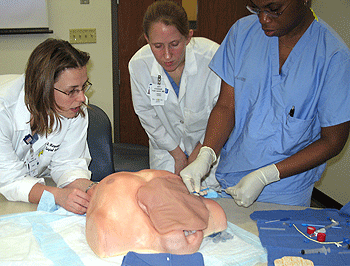Fourth-year medical students planning to enter surgical fields have the opportunity to get a head start through the Accelerated Skills Preparation for Surgical Internship course at the School of Medicine.
The course, in its second year, is open to 20 students planning to enter a surgical subspecialty and is designed to help them develop their technical skills before they begin their internship, said L. Michael Brunt, M.D., professor of surgery and coursemaster.

“It’s very clear that surgical skills training outside of the operating-room environment is increasingly important for graduate medical education, particularly for residents,” Brunt said.
During the seven-week course, students use low-tech simulators to learn a variety of surgical skills, ranging from basic suturing and knot-tying skills to more advanced techniques such as laparoscopic skills. In addition, they have an opportunity to be “on call” for Barnes-Jewish Hospital to learn what to do in response to typical pages an intern might receive.
“We want to get them to the point where they can hit the ground running when they start their internships and their hours and workload increase and there are many things to focus on,” Brunt said. “This way, they have an opportunity to learn in a low-key environment with time to practice skills and refine and develop them further in order to become better surgical residents.”
Mary E. Klingensmith, M.D., associate professor of surgery and residency training director, also teaches in the course. She said it accelerates the students so that during their first year of surgical residency, they have mastered skills some students from other medical schools may not have experienced.
“This course puts our students ahead of the game,” she said. “They are in a big transition in life. If we can help them with this aspect, they’ll have the chance to be more successful physicians than they otherwise might be.”
Julie Margenthaler, M.D., assistant professor of surgery, said the course provides students with a focused approach to the types of procedures, clinical issues and surgeries that they will encounter during their internship.
“These are the types of learning experiences that most surgical interns around the country learn ‘on the job’ by trial and error,” Margenthaler said. “Our students understand that learning the techniques in a classroom will offer them an advantage when they are faced with these problems in actual patients.”
Students say they appreciate not only the extra practice they get before starting their internships but also Brunt’s efforts.
“Dr. Brunt’s dedication and the collaboration of the other surgeons who assisted him are a testament to the commitment of the Department of Surgery to furthering undergraduate and graduate medical education,” said fourth-year medical student Lola Fayanju, who will begin a residency in general surgery at Barnes-Jewish this summer. “Although one can never feel completely ready for internship, I do feel a little less panicked now that I’ve completed these sessions.”
Amber Traugott, M.D., a surgical intern at Barnes-Jewish who took the course last spring, said the course helped her feel less anxious before starting her internship and gave her “a leg up.
“One of the best things about the course is that it helps alleviate some of the anxiety you feel as a fourth-year medical student about to become an intern in surgery,” Traugott said. “We worked with cases with common surgical problems that you might get called about when you’re a junior resident and need to have a handle on the first day. It’s helpful to have kind of gone through those scenarios beforehand so that the first time it happens, the process is not a new thing.”